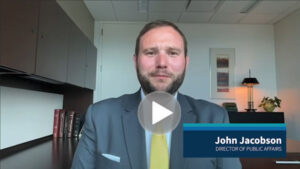Capitol Connection, September 2023
By John N. Jacobson
September 15, 2023
In this issue:
- Welcome to the Ruder Ware Capitol Connection
- Note From Public Affairs Director John Jacobson
- Top Three Issues Of Interest
- Ruder Ware Tracker
WELCOME TO THE RUDER WARE CAPITOL CONNECTION
The ever-changing landscape of state government requires businesses across all industries to stay informed on the happenings in Madison. Welcome to Ruder Ware’s Capitol Connection. Director of Public Affairs John Jacobson will provide nonpartisan news and analysis from Madison regarding workforce development, changes in tax and regulation, and other general topics that may impact you or your business.
NOTE FROM PUBLIC AFFAIRS DIRECTOR JOHN JACOBSON
After breaking for the summer in June, following passage of the 2023-2025 State Budget, lawmakers returned to Madison this week to continue the work of the 106th Wisconsin State Legislature.
The State Assembly was in session on Tuesday this week, with both chambers in session on Thursday.
The final months of the legislative session are expected to be turbulent. From the Wisconsin Supreme Court’s ideological makeup shifting for the first time in over a decade, to competing plans on both childcare and income taxes, political overtones are likely to continue dominating the news cycle.
The session will formally conclude in spring of next year when lawmakers will return to their districts to campaign for re-election. The next legislative session will begin with inauguration in January of 2025.
TOP THREE ISSUES OF INTEREST
- WISCONSIN SUPREME COURT/LEGISLATIVE REDISTRICTING
 Supreme Court Justice Janet Protasiewicz was elected earlier this year with an 11-point victory over former Supreme Court Justice Daniel Kelly. She was sworn onto the state’s highest court in August.
Supreme Court Justice Janet Protasiewicz was elected earlier this year with an 11-point victory over former Supreme Court Justice Daniel Kelly. She was sworn onto the state’s highest court in August.
Several challenges to Wisconsin’s current legislative boundaries are making their way through state courts, with at least one expected to be decided by the high court. Republicans hold 22 of 33 seats in the State Senate and 64 of 99 seats in the State Assembly.
Depending on the court’s decision, legislative boundaries could shift, lessening the majority party’s advantage in the current maps.
Republicans have also retained legal counsel to defend challenges to the current maps. In early September, it was reported that GOP lawmakers have earmarked $1.8 million to retain attorneys at three firms.
Some Republican lawmakers have also called for impeachment of Justice Protasiewicz based on comments she made about the state’s current legislative boundaries while campaigning earlier this year.
The Wisconsin Constitution prescribes that impeachment may be brought on charges of corrupt conduct in office or the commission of a crime or misdemeanor. Impeachment requires a simple majority vote in the Assembly. Conviction requires a two-thirds majority vote in the Senate.
Impeachment talk was toned down on Tuesday when Assembly Speaker Robin Vos announced that his chamber would endorse a bill that implements a nonpartisan redistricting commission in Wisconsin, similar to the model used in Iowa. That commission would redraw maps in time for the 2024 election cycle.
The Assembly passed that bill on Thursday. At the time this is being authored, the Senate has not yet acted on the bill. Governor Tony Evers and legislative Democrats have expressed skepticism.
Legislative leaders in both chambers have punted on whether their respective bodies may move forward with such a move.
The only time a Wisconsin Supreme Court Justice was impeached occurred in 1853, though the Senate did not vote to convict on the allegations of accepting bribes.
- SPECIAL SESSION: CHILDCARE, HIGHER ED, AND WORKFORCE

On August 8, Governor Tony Evers signed Executive Order 208, calling a special session of the Wisconsin State Legislature on September 20.
From the Office of the Governor: “To meaningfully and comprehensively address the state’s workforce challenges, Gov. Evers is proposing to invest over $1 billion using a portion of the state’s readily available $4 billion budget surplus to prevent a looming collapse of the state’s child care industry and ensure child care is affordable and accessible for working parents and families, expand paid family leave, invest in higher education to help educate, train, retain, and recruit talented workers, and support targeted solutions to workforce challenges in high-need areas, specifically the state’s healthcare and education workforce sectors.”
More specifically, the Governor’s proposal includes spending on three key topics, including:
Childcare
-
- $340 million, including $38.9 million in Temporary Assistance for Need Families (TANF) funds, for the Child Care Counts program
- $22.3 million for the Partner Up! Program
Higher Education
-
- $9.4 million for UW System
- $4.3 million for private, nonprofit colleges
- $3.5 million for Wisconsin Technical College System
- $73,500 for Tribal Colleges
Workforce Sectors
-
- $10 million for nurse educators program
- $6 million for WisCaregiver Careers program
- $1.5 million for Qualified Treatment Trainee Grant Program
- $17 million for healthcare opportunity grants
- $936,600 and one new position for DWD outreach
- $22.5 million for healthcare innovation grants
- $1.2 million for graduate medical training support grants
- $5 million for “grow your own” educator program
- $9.4 million for student teacher and intern stipends
While Governor Evers’ special session will not be held until later this month, the Assembly on Thursday passed a package of GOP-authored bills aimed at increasing access to childcare. The Senate has not yet acted on the bills. Governor Evers has indicated he will veto these measures.
Assembly Bill 387 by Representative Joy Goeben and Senator Romaine Robert Quinn
“[This bill] creates a program, similar to healthcare flexible spending accounts, where parents or legal guardians may establish accounts from which qualifying childcare expenses are paid on a pre-tax basis.”
Assembly Bill 388 by Representative Karen Hurd and Senator Jesse James
“[This bill] would create a revolving loan fund to enable childcare provider[s] to expand capacity.”
Assembly Bill 389 by Representative Joy Goeben and Senator Joan Ballweg
“[This bill] is aimed at helping to expand the supply of new childcare slots by creating a new category for family day care providers.”
In addition to the existing three categories of Family Centers, Group Centers, and Day Camps, the bill would create the category of Large Family Center.
Assembly Bill 390 by Representative Joy Goeben and Senator Joan Ballweg
This bill
- Lowers the minimum age from 17 to 16 years to become an assistant childcare teacher or school-age group leader.
- Lowers the minimum age from 18 to 16 years to independently provide sole supervision to a group of children.
- Allows assistant childcare teachers to supervise children in full-day care centers without restrictions related to opening and closing hours, designated nap times, and time limits.
Assembly Bill 391 by Representative Joy Goeben and Senator Joan Ballweg
“[This bill] increases the maximum group size and minimum number of child care workers for certain child age categories in a Group Child Care Center as regulated by the Department of Children and Families.”
Assembly Bill 392 by Representative Joy Goeben and Senator Romaine Robert Quinn
“[This bill] allows a certified child care provider to, for compensation including payments under Wisconsin Shares, provide child care and supervisor to up to six children under the age of seven regardless of whether the children are related to the provider and without having to obtain a license from DCF.”
- INCOME TAX REDUCTION
 On August 29, Republican lawmakers announced their intentions to partially reintroduce an income tax cut that was previously vetoed by Governor Tony Evers as part of the 2023-2025 State Budget.
On August 29, Republican lawmakers announced their intentions to partially reintroduce an income tax cut that was previously vetoed by Governor Tony Evers as part of the 2023-2025 State Budget.
The plan was passed by the Assembly on Tuesday. While the Senate has not yet acted, Governor Evers has indicated he will veto the proposal.
The plan would:
- Reduce the state’s third income tax bracket from a rate of 5.3% to 4.4%
- Exempt from income tax up to $150,000 in retirement income for joint filers and $100,000 for individual filers.
- Amend the Wisconsin Constitution to require a two-thirds vote by the legislature to raise sales, income, or franchise taxes.
RUDER WARE TRACKER
- Senate Bill 169/Assembly Bill 180: Establishing a hotline for employers interested in hiring individuals with a conviction record.
- Senate Bill 274/Assembly Bill 277: The amount and distribution of the real estate transfer fee.
- Senate Bill 374/Assembly Bill 375: Wisconsin and Minnesota income tax reciprocity.
- LRB-3816: Funding for the Wisconsin Institute for Sustainable Technology at the University of Wisconsin-Stevens Point and making an appropriation.
- LRB-3750: Permits for certain oversize or overweight vehicles transporting forest products.
- LRB-0240: Construction contractor registration and granting rule-making authority.
- LRB-0242: Employee misclassification and providing a penalty.
- LRB-2102: Rural creative economy grant program and making an appropriation.
Back to all News & Insights
This document provides information of a general nature regarding legislative or other legal developments, and is based on the state of the law at the time of the original publication of this article. None of the information contained herein is intended as legal advice or opinion relative to specific matters, facts, situations, or issues, and additional facts and information or future developments may affect the subjects addressed. You should not act upon the information in this document without discussing your specific situation with legal counsel.
© 2024 Ruder Ware, L.L.S.C. Accurate reproduction with acknowledgment granted. All rights reserved.


